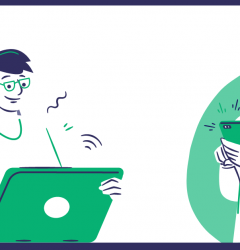20 Aug

This article will explain what are deepfakes, how deepfakes may damage business and how to prevent such fraudulent activities. If you work in a company that has to verify users identity, and you want to avoid revenue losses you may find here some interesting information.
How are deepfakes made?
Deepfakes are recordings prepared with the use of artificial intelligence, in which the face of a specific person can be inserted into any video material. To create a convincing video, fraudsters need photos or videos on which deepfake will be based. By using these data and algorithms, a computer program learns how to imitate a person’s voice and facial expressions, movements, mannerisms, intonation, and vocabulary of a given person.
Deepfakes and identity theft
By using deepfakes, fraudsters impersonate someone to open or get a permission to an account or or access some service. Cybercriminals collect data in many ways, the most simple one is social media. Identity theft using deepfake technology can take many forms like using the victim’s voice to change the password in a bank or asking subordinates or the family for an immediate transfer. Such an event took place in August 2019, when an employee of a British company was tricked into sending cybercriminals £ 200,000. The victim was convinced that she was talking to her boss and carrying out his order to transfer money to the supplier. The boss’s voice was so well forged (suitable accent, tone of voice, style of speaking) that it didn’t arouse the employee’s suspicion.
KYC platform for global customer onboarding
Decrease onboarding costs up to 46% Improve pass rates up to 26% Complete verifications in less than 15s.
Many organizations and companies wonder if these techniques pose a threat to eKYC processes and if such videos could be created to spoof identities in customer engagement processes.
Those who use video verification solutions to onboard clients don’t have to worry. Video verifications that are backed by a specialist and biometric processes that can verify the identity of individuals using advanced techniques can recognize whether the recording is in real-time or computer-generated.
In live video identification during a video call, it is next to impossible to cheat the procedure by using deepfakes. This is because of both automated and manual checks aimed at detecting such spoofing procedures.
During the connection, the specialist pays attention to the background and how the character interacts with it, whether the light and shadows look realistic and whether there are any strange disturbances in the recording. When dealing with deepfakes, it is also worth paying attention to the appearance of teeth and eyes, as well as details related to clothing. These are often problematic elements to animate.
Automated identity verification and deepfakes
But what about those who use automated identity verification tools? To be honest, until now there were less than a few proper KYC tools that could offer a proper level of security during an automated user verification process. Until now. Fully-Verified automated KYC service – Auto-Verify allows users to access a given platform within as little as 10 seconds without any friction, while at the same time preventing the most advanced fraud attempts such as deep fakes.
Legal regulations
According to Technology Review, deepfake has been hailed as the biggest threat on the web in 2019. Existing legal norms often do not keep up with technological progress, and more and more countries are trying to deal with this problem. China has introduced new government regulations on fake news and deepfakes. They must be properly marked in terms of the use of artificial intelligence. Failure to disclose this fact is to be treated as a crime. During the elections, the United States introduced sanctions for the dissemination of deepfakes depicting politicians.
How to deal with deepfakes?
How to recognize when we are dealing with a joke and when with the manipulation of someone else’s image? What can be done to prevent deepfakes from being used in a harmful way? It is already known that it is impossible to prevent the creation of deepfakes. Still there are solutions that detect fake videos based on artificial intelligence. If you’re interested in an automated KYC service that will prevent deepfakes from being used in your verification process, please see this site.
KYC platform for global customer onboarding
Decrease onboarding costs up to 46% Improve pass rates up to 26% Complete verifications in less than 15s.
Related Post
Search
Recent Post
 Protecting Players and O…June 15, 2023
Protecting Players and O…June 15, 2023 From Anonymous to Accoun…May 25, 2023
From Anonymous to Accoun…May 25, 2023 The Future of Identity V…May 10, 2023
The Future of Identity V…May 10, 2023 Is It Time to Invest in …April 26, 2023
Is It Time to Invest in …April 26, 2023 KYC in financial and ban…March 24, 2023
KYC in financial and ban…March 24, 2023
Categories
Archives
- June 2023
- May 2023
- April 2023
- March 2023
- January 2023
- December 2022
- October 2022
- August 2022
- July 2022
- June 2022
- April 2022
- March 2022
- February 2022
- January 2022
- December 2021
- November 2021
- October 2021
- September 2021
- August 2021
- July 2021
- June 2021
- May 2021
- April 2021
- March 2021
- February 2021
- January 2021
- November 2020
- July 2020
- March 2020
- November 2018
Fully-Verified was created as answer to its founders collectively losing over $150 000 to various types of fraud in their eCommerce businesses.









